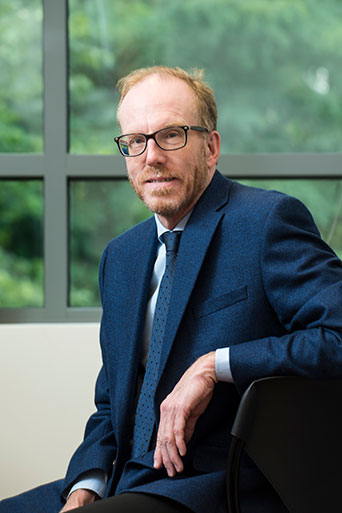
Chair of the Department of Bioengineering, Michael Buschmann, says this new initiative will offer a path for students to learn about the clinical setting of bioengineering. Photo by Ron Aira.
The Volgenau School’s Department of Bioengineering is partnering with units in Mason’s College of Health and Human Services (CHHS) to bring students from different disciplines together to identify medical problems and engineer holistic and innovative solutions.
The new program, funded by a nearly $200,000 grant from the U.S. Department of Health and Human Services, will take bioengineering students on a six-week clinical immersion into major hospitals in the D.C., Maryland, and Northern Virginia area, starting in summer 2021.
Students will be placed in Inova Hospital, Georgetown Hospital, or Children’s National Medical Center for the summer. “Bioengineering students will spend time in the hospitals looking at various clinical issues and problems, and I will be working with them to identify critical needs that they can target and build solutions for, as part of their senior design projects,” says Shani Ross, associate chair of the Department of Bioengineering.
After the summer immersion program, bioengineering students will start their year-long senior design projects. They will then collaborate with students from nursing, health administration, and health informatics as they devise solutions to the clinical needs that they identified over the summer.
Students will also be advised by a clinical mentor from one of the hospitals, a faculty advisor in the Department of Bioengineering, an advisor from either the School of Nursing, the Health Administration program, or the Health Informatics program, and then an industry advisor from the Mason Bioengineering Alliance. “We are providing an enriched real-world environment for students to work in and develop their network of colleagues with complementary skill sets,” says Michael Buschmann, chair of the Department of Bioengineering.
This new way of completing senior design offers new skills and pathways for bioengineering students to complete their education. “Currently, our senior design projects are either faculty or industry-sponsored and the problems they need to solve are already given to them. The clinical immersion approach allows our undergraduate students to experience a clinical environment and to identify challenges where the can apply their knowledge and skills to find workable solutions,” says Buschmann.
The collaboration between the three disciplines was developed to give students a holistic view of health. “We started to explore the possibilities of how do we integrate these multiple lenses of bioengineering, health informatics, and in the clinical side with nursing and give them real experience here at Mason,” says Janusz Wojtusiak, associate professor of health informatics and collaborator on the initiative.
The grant will fund the program for five years, with part of the funds going to the cost of summer clinical immersion, and the rest going towards materials to build their designed solutions. At the end of each year, teams will have a completed project that includes the viewpoints of nursing, health administration, and health informatics concerns.
“Everything needs to be considered. The end-user for a lot of new medical technologies is nurses, and ease of use and patient care is the top priority from our perspective, and health informatics and bioengineering have different lenses too,” says Cheryl A. Oetjen, interim director of the School of Nursing.
“It helps them to connect the dots and see the complete picture of how a change in health is made,” says Oetjen.
